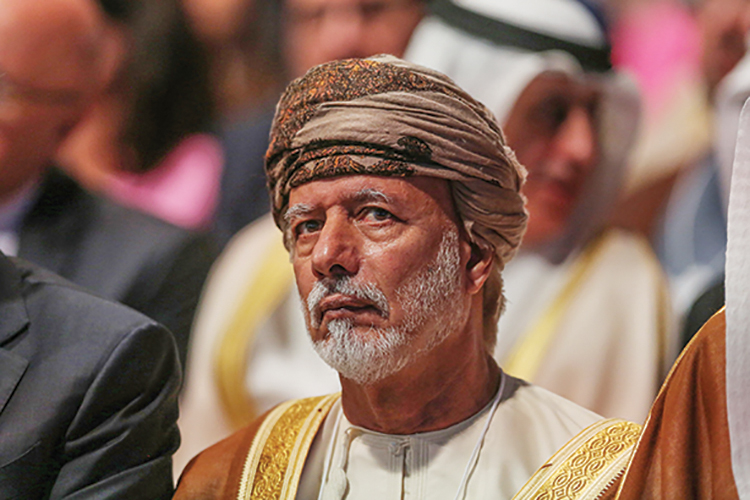

SUWEIMEH, Jordan:A top Omani government official yesterday said Arabs must take initiatives tomake Israel overcome "fears for its future" in the region, drawingcriticism from Jordan. The remarks by Yusuf bin Alawi bin Abdullah, theminister responsible for foreign affairs in Oman, came on the sidelines of theWorld Economic Forum hosted by Jordan on the shores of the Dead Sea. "TheWest has offered Israel political, economic and military support and it nowholds all the means of power... but despite that it fears for its future as anon-Arab country surrounded by 400 million Arabs," he said.
"I believethat we Arabs must be able to look into this issue and try to ease those fearsthat Israel has through initiatives and real deals between us and Israel,"he told a panel discussing geopolitics. The panel's moderator, journalistHadley Gamble, interrupted him to ask if the best solution to the decades-longIsraeli-Palestinian conflict is "recognizing Israel and its right toexist". The minister said no. "Not recognizing, but we want themthemselves to feel that there are no threats to their future."
Jordanian ForeignMinister Ayman Safadi, whose country is the only Arab nation along with Egyptto have a peace treaty with Israel, dismissed the remarks saying "theissue is that there is an occupation" of Arab land. "The Arab worldhas recognized Israel's right to exist. The Palestinians themselves recognizedthe Israeli right to exist... that is not the issue," Safadi told thepanel. "The issue is that there is an occupation. Is this occupation goingto end or not?
Israel, Safadisaid, must "withdraw from Arab lands occupied since 1967 and allow"the creation of a Palestinian state. "This is the issue," he said."If they (Israel) say they are not comfortable, that is not myproblem," said Safadi. "The problem is not with Arabs givingassurances... the problem is with Israel doing what is right for peace,"he added. "Israel... is not doing the right thing. Actually it is doingmore of the wrong things by suffocating Palestinians," the Jordanianforeign minister said, referring to the Israeli-blockaded Gaza Strip."Gaza, is probably as you heard many times, the world's largest prison,"he added.
In recent months,Israel has been courting Gulf Arab states. In February, Israeli Prime MinisterBenjamin Netanyahu met one-on-one with Bin Alawi at an international conferencein Warsaw, attended by officials from Saudi Arabia, Bahrain and the United ArabEmirates. In October last year, Netanyahu held surprise talks with Oman'sSultan Qaboos in Muscat - raising Palestinian fears of a normalization of ties.
Last year binAlawi told a regional conference in Bahrain it might be "time for Israelto be treated the same (as states in the Middle East) and also bear the sameobligations". Bahrain endorsed the remarks which at the time were said tobe aimed at moving the Israeli-Palestinian "narrative from intractabilityto a new focus of pragmatism".
Meanwhile,Netanyahu said he has told US President Donald Trump that Israel would notremove "even one person" from a settlement as part of a future peaceplan. "I said there shouldn't be the removal of even one settlement"from the occupied West Bank, Netanyahu told Israel's Channel 13 television inan interview broadcast Friday. Washington is expected to unveil proposals forIsraeli-Palestinian peace sometime after Tuesday's Israeli election in whichNetanyahu is seeking a fifth term.
The Israeli primeminister was asked if he was familiar with the details of the US plan, replyinghe knew "what should be in it". Along with settlements, "ourongoing control of all the territory west of the Jordan" River was afurther condition set by the Israeli premier for any US-led peace initiative.Netanyahu said he informed Trump not "even one person" would beevicted from a settlement, telling Channel 13 he doubted such a request wouldbe made. If such a measure is tabled, Israel would pull out of Washington'splan according to Netanyahu.
Settlements builton land occupied by Israel in the 1967 Six-Day War are deemed illegal by theinternational community and their ongoing construction is seen as a majorbarrier to peace. More than 400,000 Israelis live in West Bank settlements,while a further 200,000 live in settlements in occupied east Jerusalem. WhileNetanyahu has a close relationship with the US president, Palestinian presidentMahmoud Abbas cut off relations with Washington after Trump declared thedisputed city of Jerusalem Israel's capital in December 2017.
The Palestinianssay the US government's pro-Israel bias meant it could no longer lead peacenegotiations between them and Israel, while US officials argue their plan willbe fair. Israeli-Palestinian peace efforts have been at a standstill since2014, when a drive for a deal by Barack Obama's administration collapsed.Netanyahu said Friday his position on settlers had also been relayed to theformer US president. - Agencies

